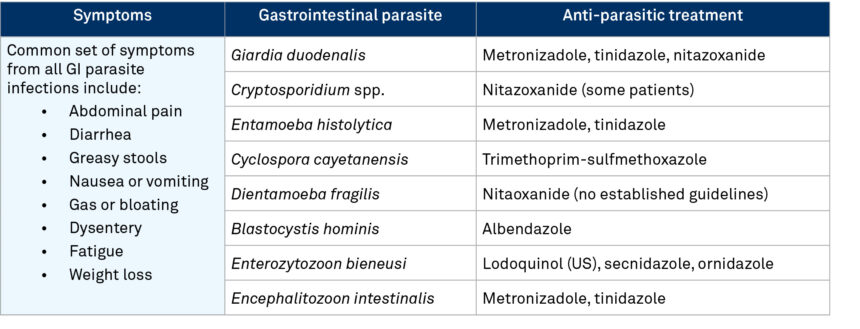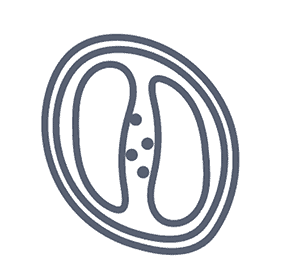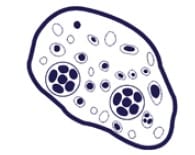Cyclosporiasis: symptoms, prevention & treatment

Cyclosporiasis symptoms
Cyclospora cayetanensis: symptoms of infection
Cyclospora infects the small intestine, typically causing a range of gastrointestinal symptoms such as;
- profuse watery diarrhea,
- sometimes explosive bowel movements, and
- abdominal cramping.
Other symptoms can also include nausea, fatigue, low-grade fever, anorexia, and weight loss.
In more severe disease mucus or blood can be found in the stool which occurs most commonly in infants, the elderly, and immunocompromised patients such as those living with HIV/AIDS. Symptoms in these hosts can include acalculous cholecystitis. Guillain-Barré syndrome, ocular inflammation, reactive arthritis, and sterile urethritis have also been reported [1].
Travelers from non-endemic countries are likely to experience more severe infection. Prolonged diarrhea can result in dehydration and malnutrition and may infrequently result in death, particularly in infants and individuals with other infections or co-morbidities.
Healthcare providers should consider Cyclospora as a potential cause of prolonged diarrheal illness, particularly in patients with a history of recent travel to Cyclospora-endemic areas.
The benefits of employing molecular syndromic testing for overlapping gastrointestinal signs and symptoms
Genetic Signatures' EasyScreen Gastrointestinal Parasite Detection Kit can detect 8 parasite pathogens from a single sample, in a single test, increasing the likelihood of identifying co-infections from multiple parasites that might be missed with traditional testing methods. This is particularly important in cases where patients present with non-specific or overlapping symptoms that could be caused by a variety of gastrointestinal pathogens.
Preventing Cyclospora infection
Preventing Cyclospora infection primarily involves maintaining good hygiene, ensuring safe water consumption, and practicing safe food handling.
The CDC recommends those travelling to regions with endemic Cyclospora, risk of infection can be reduced by following recommended food and water precautions. However, Cyclospora oocysts are resistant to water disinfection by using chlorine or iodine [2].



Treatment for Cyclospora infection
Currently there is no vaccine is available for cyclosporiasis but early detection and treatment can yield a favourable clinical outcome. Standard chemotherapy regimens including treatment with trimethoprim and sulfamethoxazole which is considered as an effective drug, with many studies reporting low recurrence rates [3].
Treatment challenge:
Treatment of gastrointestinal parasite infections is challenging due to parasite diversity and their specific treatment requirements, despite causing common symptoms (see table below). Misdiagnosis can lead to ineffective treatment. In addition, misuse or overuse of anti-parasitic drugs can lead to the development of antimicrobial resistance. Thus, timely and accurate detection of parasitic pathogens can support appropriate patient management and improve health outcomes.

Syndromic testing for 8 gastrointestinal parasites in a single test
Up to 60 patients screened in a single, automated workflow...with same day reporting!

Find out more about our unique 3base™ solution for detecting gastrointestinal parasites
References
- Mathison BA, Pritt BS. Cyclosporiasis-Updates on Clinical Presentation, Pathology, Clinical Diagnosis, and Treatment. Microorganisms. 2021 Sep 2;9(9):1863. doi: 10.3390/microorganisms9091863. PMID: 34576758; PMCID: PMC8471761.
- Li J, Cui Z, Qi M, Zhang L. Advances in Cyclosporiasis Diagnosis and Therapeutic Intervention. Front Cell Infect Microbiol. 2020 Feb 11; 10:43. doi: 10.3389/fcimb.2020.00043. PMID: 32117814; PMCID: PMC7026454.
- CDC Yellow Book - Cyclosporiasis. wwwnc.cdc.gov/travel/yellowbook/2024/infections-diseases/cyclosporiasis#prevent







